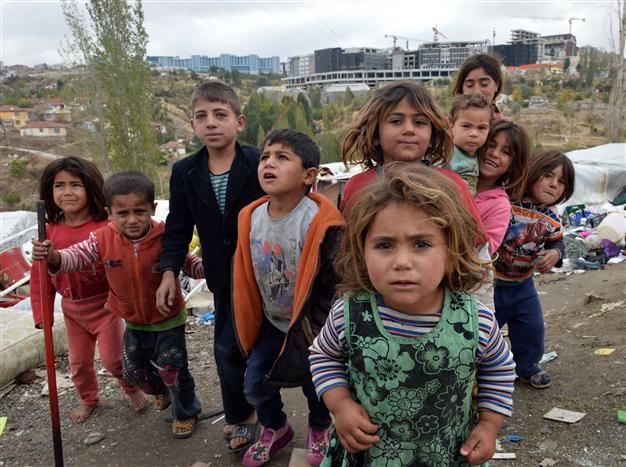Displaced Syrians put down roots in Ankara
Fırat Şenol ANKARA

A group of around 250 displaced Syrians lives in the capital city of Ankara. DAILY NEWS photo, Selahattin SÖNMEZ
Crying barefoot children, no running water, ramshackle huts, and cooking pots over fires of discarded trash... A group of around 250 displaced Syrians, fleeing the civil war in their country and eking out a meager existence. This isn’t a scene out of one of the many makeshift camps of displaced Syrians in southeast Turkey. This is downtown Ankara, the Turkish capital.While stories are rife of displaced Syrians building makeshift accommodation across the country, one of the last places anyone would think to find one would be the center of the capital itself. At the end of Dikmen valley, a former slum is being rebuilt as a housing center, around 250 Syrians have built themselves lodgings using anything they can find; from pieces of wood to government posters.
The Hürriyet Daily News visited the largest of the camps, a collection of 10 makeshift tents. The insides were covered in threadbare carpets in an attempt to fight off the cold weather. “We need heaters. We need food. We need medicine,” said Edo Adossodo, a young Syrian. “We need help now.”
The group had left the Syrian city of Aleppo six months ago because of the heavy fighting between rebels in the city. “They killed our neighbors and destroyed our homes, everything we owned. We have nothing, they burned everything we had,” said Abdullah Ghanikaya, one of the refugees. When asked why they were in Ankara, Ghanikaya said there was no space in any of the refugee camps. “We walked [across the border] to Turkey, but we could not get into any of the refugee camps. They were too crowded. Some people in Gaziantep helped us get to Ankara three months ago and we have been here ever since.”
Ghanikaya said the group had initially been much smaller, but had grown as family members got back into contact with each other. “We are 250 people in the valley at the moment, five families. Entering Turkey was no problem,” he said, adding that the border guards let them through with minimal checks.
Their trek to the city was helped both by cars they had acquired on the way and the charity of several people in Gaziantep. After finding an empty plot on the valley and surprised by the friendliness of their neighbors, the refugees decided to put down roots.
The camp has no running water, the makeshift tents are not insulated in any way, and hygiene is non-existent. None of the children can go to school, but education is really last on the list of priorities anyway. Fires in paint cans cook whatever food the refugees can scrounge cover the smell of their open toilets. Nevertheless the tents, as cold as they are, are solid constructs, with much of their material coming from the nearby construction projects.
The displaced Syrians gather scrap and trash in an attempt to make ends meet, but with the approaching winter many of them are worried. “We don’t have any money, any bread, or any wood. We need heaters,” Ghanikaya said. “Winter is coming. We cannot live like this. We need help.”
Ghanikaya pointed out that only half of the 70 children in the valley had shoes and even fewer had coats.
Living through Ankara’s harsh winters will be impossible without heating equipment and appropriate clothing. With temperatures set to hit freezing this weekend, the question is how long it will take for someone to take action.
“They are suffering so much, someone needs to help them,” said one of their Turkish neighbors. Those in the surrounding area, according to this neighbor, have tried to help the refugees, but say they can only do so much.
















